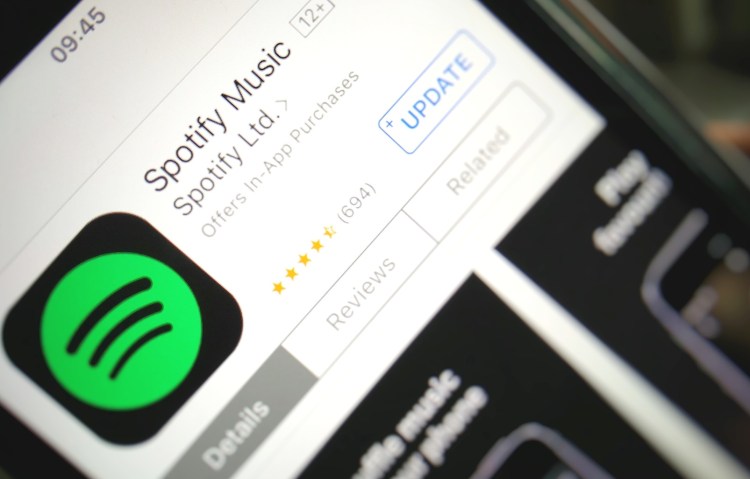Spotify announced that it has filed a complaint against Apple with the European Commission (EC), citing anti-competition practices and a business model that gives Apple an “unfair advantage.”
“In recent years, Apple has introduced rules to the App Store that purposely limit choice and stifle innovation at the expense of the user experience — essentially acting as both a player and referee to deliberately disadvantage other app developers,” noted Spotify cofounder and CEO Daniel Ek in a statement. “After trying unsuccessfully to resolve the issues directly with Apple, we’re now requesting that the EC take action to ensure fair competition.”
Spotify’s complaint against Apple goes back many years and is largely targeted at the way Apple controls the iOS platform — which Spotify relies upon to operate on iPhones and iPads — and the App Store. To muddy the waters further, Apple also operates a competing music-streaming service. Indeed, Apple charges digital services such as Spotify a 30 percent commission on all revenues garnered through the app, which means that Spotify has in the past charged a higher fee for subscriptions on iOS — $13 per month versus $10 through the web. Apple Music, meanwhile, costs $10 per month.
Commission
Apple first started charging its 30-percent commission on in-app transactions back in 2011. Five years later, it tweaked its fee structure so that its 30 percent cut would drop to 15 percent in subsequent years. Spotify didn’t actually allow any in-app subscriptions through iOS between 2011 and 2014, at which point — due to “constant pressure” — it elected to offer premium subscriptions through Apple’s billing system at an inflated rate. In 2016, Spotify removed this option, though only for new subscribers who weren’t already signed up through Apple’s in-app payment (IAP) system.
June 5th: The AI Audit in NYC
Join us next week in NYC to engage with top executive leaders, delving into strategies for auditing AI models to ensure fairness, optimal performance, and ethical compliance across diverse organizations. Secure your attendance for this exclusive invite-only event.
Netflix recently joined Spotify in ditching its iTunes billing for new users for similar reasons.
“Apple requires that Spotify and other digital services pay a 30 percent tax on purchases made through Apple’s payment system, including upgrading from our Free to our Premium service,” Ek said. “If we pay this tax, it would force us to artificially inflate the price of our Premium membership well above the price of Apple Music. And to keep our price competitive for our customers, that isn’t something we can do.”
Spotify’s complaint extends beyond fees. It has also sought to communicate with its iOS users to ensure they know they can pay for a premium subscription outside of Apple’s ecosystem, but this isn’t something Apple is eager to encourage. Not only would it mean missing out on its cut of Spotify’s revenues, it would set a dangerous precedent for other companies to follow.
“If we choose not to use Apple’s payment system, forgoing the charge, Apple then applies a series of technical and experience-limiting restrictions on Spotify,” Ek said. “For example, they limit our communication with our customers — including our outreach beyond the app. In some cases, we aren’t even allowed to send emails to our customers who use Apple. Apple also routinely blocks our experience-enhancing upgrades.”
According to Ek, Apple has previously hindered Spotify from integrating fully with its Siri voice assistant, which has also meant that Spotify users haven’t been able to enjoy the full benefits of Apple’s HomePod. Spotify also recently launched a very limited version of its service for Apple Watch, something that Ek suggested was because Apple has been trying to lock “Spotify and other competitors” out of Apple services.
Remedies
Apple isn’t a company that usually tolerates being criticized in public by any third-party app developer on its platform, but Spotify is a player with major clout, so it will be interesting to see how Apple responds.
In terms of remedies, Ek suggested that Apple open up payments to alternative systems. Moreover, he said that Spotify and Apple Music should be able to compete on equal terms, rather than “based on who owns the App Store,” while Apple should “not be allowed to control the communications between services and users.”
In short, Spotify wants the freedom to use alternative non-Apple payment systems to collect subscriptions through iOS, and it wants to be able to tell its users how they can subscribe to Spotify elsewhere.
“Competition pushes us to evolve and improve both the customer and creator experience,” Ek added. “It’s not something we ever have — or will — shy away from. So, let me be clear that this is not a Spotify-versus-Apple issue. We want the same fair rules for companies young and old, large and small. It is about supporting and nurturing the healthy ecosystem that made our two companies successful in the first place.”
Outside Europe
Today’s news comes at an interesting time in the broader technology landscape, with repeated calls to break up monopolistic tech giants. Apple is currently facing a class action lawsuit in the U.S. over issues similar to those it’s up against in Europe — the complainants argue that Apple violates federal antitrust laws by requiring apps to be sold through the App Store and taking a commission from subscriptions and other in-app purchases.
Earlier this week, Senator Elizabeth Warren outlined a plan to separate online marketplaces from the businesses that sell on them — something she would like to implement if she were to become president. Though such a plan would impact many of the big tech firms, including Amazon, she also singled out Apple, saying that the Cupertino company should not be allowed to operate the App Store while also selling its own apps on the platform.
Apple is facing an onslaught on multiple fronts, and at some point something will need to give.

